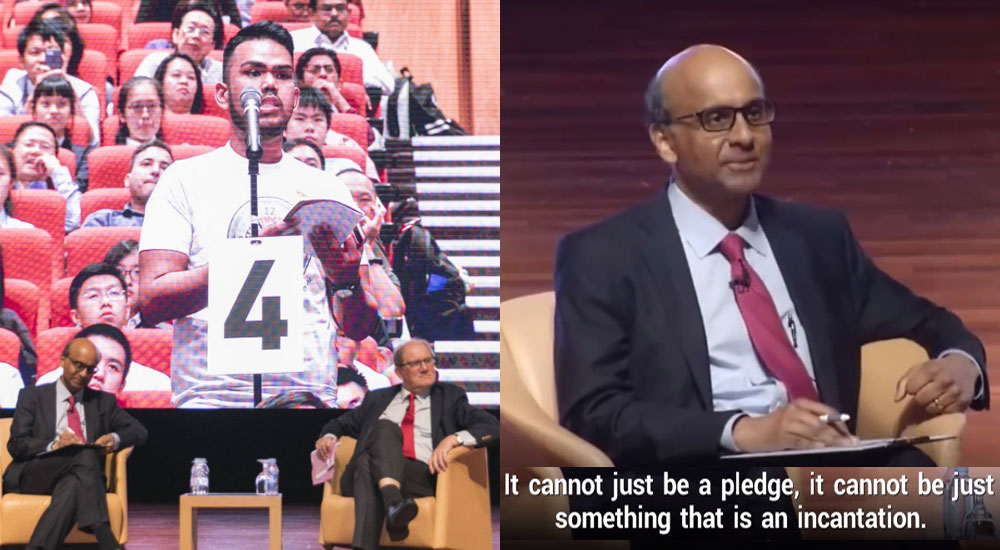When Deputy Prime Minister Tharman Shanmugaratnam signed up to speak at the inaugural Majulah Lecture at Nanyang Technological University (NTU) on Wednesday night, Sept. 20, he most likely did not foresee the event to last more than a few hours.
Well, technically, the dialogue lasted for one night only.
But the post-dialogue has gone on for more than a week.
Cheers for all things Tharman
Anything Tharman-related these days is usually met with widespread cheers among Singaporeans.
This is so as Tharman is everyone's favourite DPM and he is held up as prime minister material, due to his statesman-like demeanour, unparalleled intellect, the perception that he is inclined more to the left politically and able to put Singapore back on an even keel.
Thus, when Tharman addressed tough questions from the crowd in NTU that evening, the people cheered.
One thing he said that wasn't unreasonable was that he welcomed the debate over the controversial elected presidency reserved for minorities.
And he also complimented Singaporeans by and large, for becoming more sophisticated over time as they are not fools who read the mainstream media blindly but exercise careful judgement.
And if some mainstream coverage of the event were to be believed wholesale, Tharman even appeared to have rebuked his own PAP colleagues for participating in gutter politics.
His colourful comments were picked up by the various local news outlets big and small, and re-reported by mainstream and alternative media over the next few days post-event, as well as being dissected and analysed.
[related_story]
Tharman issues clarification
However, more than a week after the NTU lecture, Tharman issued a lengthy clarification on his Facebook page on Sept. 28 to set the record straight on some of his remarks.
He claimed they were taken out context or reported less than accurately than what he intended to mean, with conflation of issues not of his doing.
This sent the local mainstream media into overdrive, as it tried to set the record straight by reporting earnestly that the mainstream media is serious and responsible in Singapore, according to the very affable Tharman.
Tharman accused of dodging hard question
Unfortunately, in a social-mediated world where one can only start conversations by ending none, Tharman's post served to prolong the discussion.
On the same night that Tharman's clarification appeared on Sept. 28, a lecture participant who personally asked Tharman questions, posted about the event based on what he said that evening and accused the DPM of dodging a difficult question by not addressing it at all:
In short, the lecture participant disapproved of the use of his photo for Tharman's Facebook clarification, as he was not the one who asked about the government’s censorship of the media and also the issue of gutter politics by the People’s Action Party.
Moreover, the burning question Tharman dodged was about whether the prime minister position will be reserved for a Malay or other minority candidate in the future:
During the Majulah Lecture, I had asked the Minister two important questions. First, whether he was of the view that the Reserved Presidential Election was entrenching the notion of race into Singapore politics and if Singapore was regressing as a society. Second, I asked him if the government had any plans, in the future, of reserving the position of Prime Minister for a Malay or other minority candidate. The latter went unaddressed.
Instead, he went on talking about how Mdm Halimah Yacob was an outstanding individual and how the Government had to take proactive steps in order to turn the pledge from a mere incantation to actuality. Indeed, like him and many other Singaporeans, I have no doubt as to Mdm Halimah’s abilities. As much as I would like to believe that he missed the point, I also know that he is far smarter than that. He did what most politicians would do when presented with a hard question. He avoided it.
The post ends pessimistically enough, imploring the ruling party to not avoid difficult questions from the ground, as appeals to the electorate come election time may also be similarly ignored.
If you like what you read, follow us on Facebook, Instagram, Twitter and Telegram to get the latest updates.
